Palestinian workers stranded in West Bank fear for families in Gaza but refuse to condemn Hamas
These Palestinian men blame Israel for the war that is putting their families in jeopardy
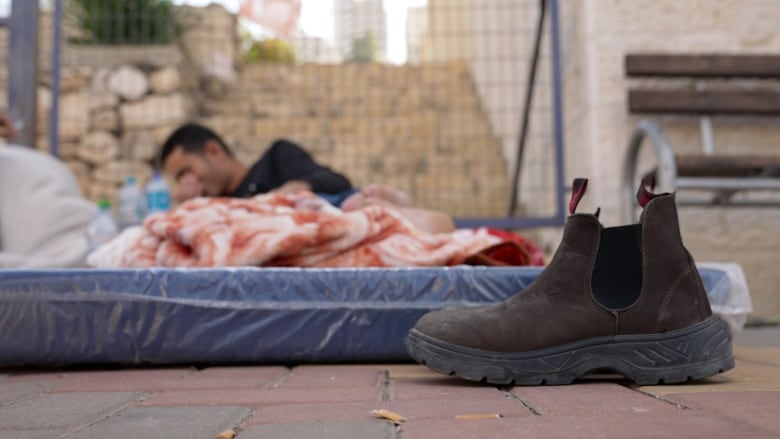
As the toll of dead and wounded from Israeli airstrikesmounts in Gaza, desperation is resonating throughout Palestinian communities in the occupied West Bank, including at one recreation centre in Ramallahhousing stranded Gazans unable to return home and fearing for their families.
The Gaza Strip and the West Bank are separate entitiesgoverned by rival political factions Hamas and the Palestinian Authority, respectively.
But in the wake of last week's horrific attack on southern Israel by Hamas militants, the West Bank has become a temporary home for hundreds of people from Gaza who were either working in Israel or visiting family in the West Bank when Hamas attacked.
Many of those now living in the recreation centre said they were arrested or otherwise rounded up by Israeli police in the hours after those attacks and brought to the centre.
They are now stranded and unable to return to Gaza, which in normal times is accessible only through Israel or Egypt,and those access pointsare now closed. Nothing is moving in or out.
Several men who spoke to CBC News at the centre expressed agony over being separated from wives and children as they endured attacks from Israeli missiles and aircraft or desperately searched for somewhere safe to hide.
None had any idea when they would see their homes and families again.
At the same time, none would blame Hamas for instigating a new war. Nor would they condemn the group for its indiscriminate killing of 1,400 Israelis, including women, children and the elderly,during last Saturday's surprise attack.
Rather, they, like many Palestinians in the region, view Hamas's attack not as an unprovoked aggression but asthe consequenceof decades of Israeli oppression.
Many of the men said they feared retribution from Israeli authorities for speaking out against its governmentand asked that they be identified only by their first names.
"I'm crying for the fate of my family," Abdullah said.
"I'm crying because I know thatone day in the near future, I'm going to hear that they are no more.I am crying for my children."
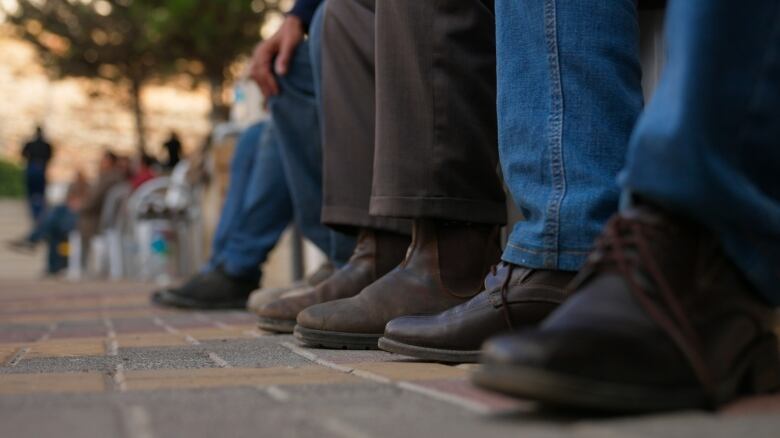
Chaotic exodus from Gaza
Abdullah, who is in his early 60s, said he is married with nine childrenand lives in Gaza City in the north of the territory, which Israel asked Gazans to evacuate in anticipation ofa ground assault.
More than one million people in northern Gaza were given 24 hours' noticeby Israel's military to flee their homes on Thursday, promptinga chaotic exodus south.
Until last Friday, Abdullah said, he had worked in Tel Aviv as a garbage collector, earning 230 shekels a day, or roughly $80 Cdn.
Before Hamas's attack, the economic situation in Gaza was dire. The unemployment rate was a dismal 46 per cent,and work permits that let people there get jobs in Israel were coveted.
In recent years,Israel's government had been gradually increasing the number issued, and more than 21,000 Palestinians were in possession of such permits at the time of the attack.
But when CBC News asked Abdullah how he felt about Hamas's horrific attacks and the murder of hundreds of people from Israel and almost 30 other countries, he placed the blame on Israel's government and the land, air and sea blockade of the territory it has enforcedsince 2007.
"It was like a big fire that left Gaza," he said. "And whoever these people are who went out of Gaza (the gunmen) have been in a blockade for many, many years.
"These people have never seen any freedom. What happened is they reacted to the blockade."
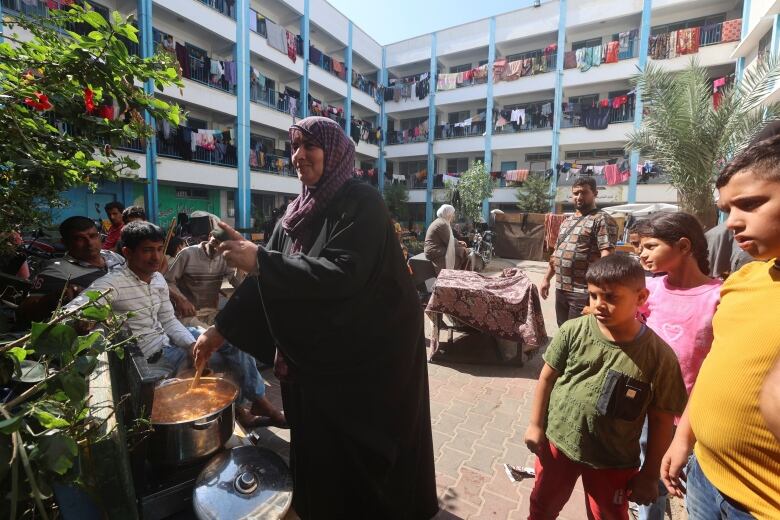
Disbelieving news reports
Another Palestinian man who spoke to CBC News said he didn't believe the news reports that have extensively documented the horrors that unfolded during the Hamas attack or the hideous images and videos accompanying them, some showing that entire families of Israelis had been killed in their homes.
"This is all a way to defame, to make the resistance fighters look bad," said Samir.
Hamas, in its charter, calls for the total destruction of Israel. Widely circulated social media videos show its militants storming a music festival and communal farm in Israel last week. In all, 260 young people were killed at the festival site alone.
For Samir, it's Israel's actions in the wake ofHamas's attack that deserve condemnation. He blamed Israel for killing Palestinian children in its relentless bombing of Gaza.
The Health Authority in Gaza says more than 700 people under the age of 18 have died in the past week and a total of 2,670people in Gaza have died since the fighting began.
"Why should they kill the children? Why should they kill the women?" Samir asked."If you're targeting resistance fighters, then why are the kids being killed?"
Hamas is still holding dozens of hostages seized in Israel last week. Videos and witnesses have confirmed they include women, children and the elderly.
Five Canadians have been confirmed dead as a result ofthe ongoing conflict.
Years of restrictions, blockades
Israel withdrew its military from Gaza in 2005but has continued to heavily restrict access to the territory.
It controls the movement of goods and has imposed a sea blockade of the coast. Human rights groups, including Amnesty International, have long criticised Israel's actions, saying they amount to collective punishment and violate international law.
Israel, on the other hand, has maintained that the blockade is necessary to protect itself.
Meanwhile, in nearby West Bank, frustration with Israel and the territory's own administration has also been growing.
In 2006, Hamas violently split from Fatah, which controls the Palestinian Authority in the occupied West Bank. The two groups have few, if any, formal contacts.
A poll commissioned by the Palestinian Center for Policy and Survey Research (PCPSR) in June 2023 suggested that while Fatah continues to be more popular in West Bank communities, support for Hamas which pushes for armed resistance to Israel and doesn't recognize its existence has been steadily increasing there.
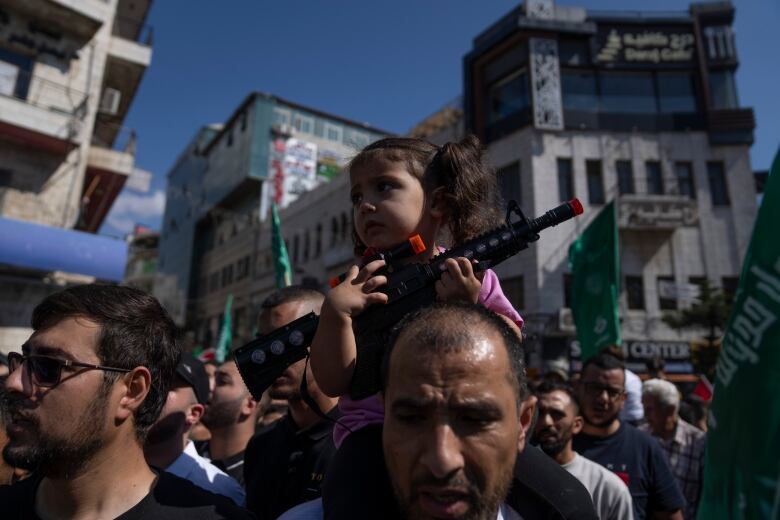
Israel's bombing campaign and the skyrocketing number of deaths in Gaza have sparked ferocious protests in the West Bankand triggered ongoing violent encounters between Palestinians and Israeli settlers.
The UN considers Israeli settlements in the West Bank to be illegal, yet under the government of Prime Minister Benjamin Netanyahu, they have spread throughout the occupied territory.
On Friday alone, 16 Palestinians were killed by gun-carrying Israeli settlers or by its military, according to the PalestinianHealth Ministry.
Under the authorization of Israel's far-right National Security Minister Itamar Ben-Gvir, thousands of guns have been handed out to Israeli settlers in the West Bank, along with helmets and bulletproof vests.
In one widely reported case this week, an Israeli settler was videoed shooting an unarmed Palestinian man at point-blank range as an Israelisoldier looked on.
CBC News has examined a copy of the video showing the shooting that was posted online. It matches with the description, location and timing that has been reported in media posts.
'People in the West Bank are so angry'
On Friday, CBC News stopped at a protest near the Qalandiya refugee camp, which is within sight of the concrete barrier that separates Israel from the West Bank.
A number of young Palestinian men wearing face coverings had set up a barricade and were burning tires.
"People in the West Bank are so angry that they are ready to throw themselves and die and kill for the sake of Gaza," said one masked man watching nearby.
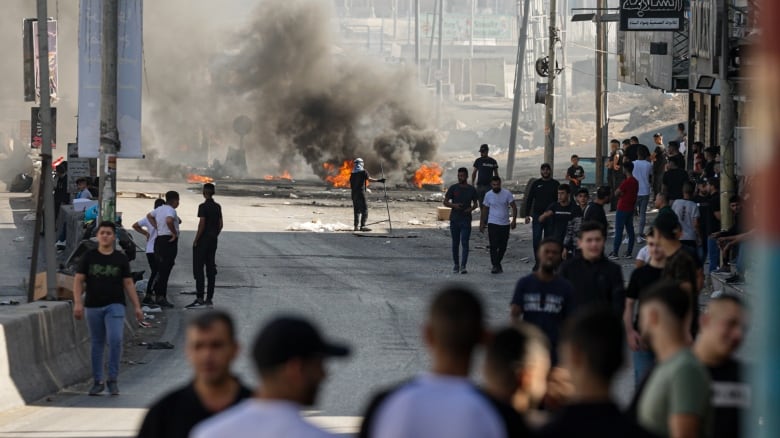
Back at the Ramallah rec centre in the West Bank, where hundreds of the stranded men from Gaza now spend their days sleeping on mattresses and living off donated food, even the volunteers delivering supplies expressed solidarity with Hamas.
"Where were you [the media] when Israel, the settlers, the government and the army has been killing our children on a daily basis?" asked Mohammed Asalieh, one of the volunteers, who lives in Ramallah.
"Our resistance fighters [Hamas] are basically responding. I see that it's a reaction to the Israeli aggressiveness against us."















_(720p).jpg)


 OFFICIAL HD MUSIC VIDEO.jpg)
.jpg)



























































































